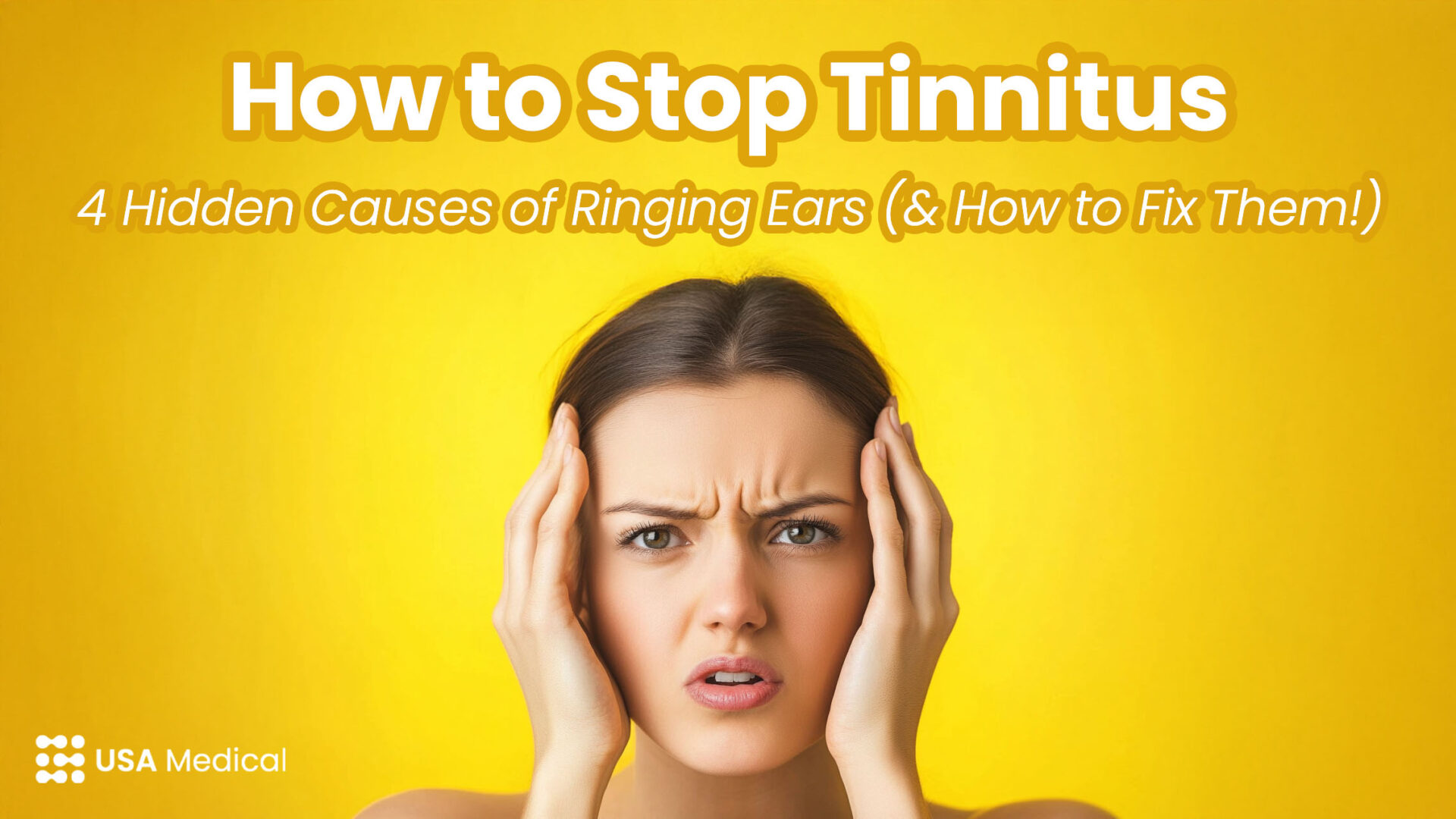“Why do my ears ring?” If you’ve ever asked this, you’re not alone. Tinnitus – the perception of ringing, buzzing, or humming with no external source – is frustratingly common, affecting about 15–20% of people (especially as we age). It can range from a mild nuisance to a debilitating problem that disrupts sleep and concentration. The constant noise in your head can drive anyone up the wall, and finding relief is not always straightforward.
Tinnitus isn’t a disease itself; rather, it’s usually a symptom of an underlying issue. Many folks try white noise machines, ear drops, or even “miracle cures,” only to be disappointed. To truly get rid of tinnitus naturally, you have to play detective and address the hidden triggers keeping that ringing alive. The good news? In many cases, tinnitus can improve when you target the root causes.
In this post, we’ll explore four hidden causes of ringing ears and exactly how to fix them. These aren’t the obvious causes like loud noise or earwax (which you should still address). Instead, we’re diving into the often overlooked factors – inflammation, high blood pressure, stress, and hearing loss – and giving you a practical at-home tinnitus treatment plan for each. We’ll also highlight the best vitamins and supplements for tinnitus relief (like the all-star Magnesium Glycinate that you’ll see in every section) to help you stop the ringing in your ears naturally.
Read on to learn why your ears might be ringing, how these hidden causes kickstart that phantom noise, and what you can do today to find relief. By the end, you’ll have a clear action plan to tackle tinnitus at the source – and hopefully enjoy some peace and quiet again.
1. Inflammation & Tinnitus
How Inflammation Triggers Ringing Ears
Chronic inflammation is your body’s red-alert system gone awry – and it can absolutely contribute to tinnitus. Inflammation is basically an immune response that, when prolonged, can damage tissues everywhere, including in the nerves and cells involved in hearing. Recent research has begun drawing a direct link between inflammation and that persistent ringing.
For example, one study found that people with chronic tinnitus had higher levels of inflammatory markers like C-reactive protein (CRP) in their blood than people without tinnitus (frontiersin.org). The researchers suggest that inflammation in the brain’s auditory pathways might help “maintain” the tinnitus perception.
In plain English: if your body is inflamed, your ear ringing may be more likely to stick around.
Inflammation can affect tinnitus in a few ways. It might irritate the auditory nerve or inner ear, essentially “turning up the volume” of the phantom sounds. There’s even evidence from animal studies – mice with noise-induced hearing damage – that brain inflammation in hearing regions triggers tinnitus symptoms. And notably, when scientists blocked a key inflammatory molecule (TNF-alpha) in those mice, the signs of tinnitus went away (news.arizona.edu). This suggests that reducing inflammation might quiet the noise (at least in certain cases).
So, if you’re dealing with tinnitus, it’s worth asking: Am I inflamed? Common signs of systemic inflammation include joint pain, persistent fatigue, digestive issues, or frequent infections. Lifestyle factors like a poor diet (high in sugar or processed foods), smoking, and chronic stress can all fan the flames of inflammation.
Testing for Inflammation-Related Tinnitus
How can you tell if inflammation is a hidden cause of your tinnitus? One clue is to get a simple blood test for inflammatory markers such as CRP (C-reactive protein). As mentioned, CRP tends to be higher in many tinnitus sufferers (frontiersin.org). If your CRP is elevated, it’s a sign your body is in a pro-inflammatory state – and this could be contributing to your ear ringing. Another clue is to notice if your tinnitus flares up when other inflammatory issues crop up. For instance, do your ears ring louder during a flare of an autoimmune condition or after eating very inflammatory foods?
You can also try an anti-inflammatory trial: adopt a strict anti-inflammatory diet and lifestyle for a few weeks and see if your tinnitus improves. Many people report that switching to a Mediterranean-style or whole-food diet, for example, reduces their tinnitus (aaaudiology.com).
In fact, one audiology report noted that a Mediterranean (anti-inflammatory) diet not only reduced tinnitus but also helped prevent age-related hearing loss, likely because reducing general bodily inflammation had a positive effect (aaaudiology.com).
In short, if you suspect inflammation is at play, treating your body to some anti-inflammatory TLC could be one of the best natural relief for tinnitus you find. The next step is figuring out how to douse those internal fires.
USA Medical Supplements for Inflammation Relief
Fortunately, fighting inflammation is something you can start doing at home with the right nutrients and supplements.
Along with an anti-inflammatory diet (think plenty of vegetables, omega-3 rich foods, and low sugar), certain natural supplements can help cool down inflammation and potentially ease tinnitus. Here are three potent options:
- CBG (Cannabigerol) – CBG is a non-psychoactive cannabinoid (a cousin of CBD) that has notable anti-inflammatory effects. Early studies suggest CBG’s anti-inflammatory properties could make it helpful for conditions like inflammatory bowel disease and even neuroinflammationmedicalnewstoday.com. By reducing inflammation systemically (including in the nervous system), CBG may help turn down the volume on inflammation-driven tinnitus. USA Medical’s CBG oil is a science-backed formula designed to soothe your brain and body. Anti-inflammatory power in a dropper!
- Turmeric (Curcumin) – Turmeric is famous as a natural anti-inflammatory spice. Its active ingredient, curcumin, has been shown in numerous studies to combat inflammation at a cellular level (pmc.ncbi.nlm.nih.gov). In fact, curcumin works along some of the same pathways as common NSAID drugs, but in a gentler way. Taking a high-quality Turmeric supplement (with black pepper for absorption) can help lower overall inflammation in the body. Many people find their joint pain and “brain fog” improve with turmeric – and some tinnitus sufferers report relief as well once inflammation is lowered. Tip: Turmeric’s benefits build up over time, so consistency is key.
- Magnesium Glycinate – Magnesium is a mineral that wears many hats. One of its crucial roles is supporting healthy nerve function and calming the nervous system (pmc.ncbi.nlm.nih.gov). Magnesium glycinate in particular is a highly absorbable form that’s gentle on the stomach. By ensuring your magnesium levels are optimized, you help regulate nerve signaling (potentially preventing the kind of over-excitation that inflammation can cause in auditory neurons) (pmc.ncbi.nlm.nih.gov). Magnesium also indirectly fights inflammation – magnesium deficiency is associated with higher inflammation, and improving magnesium intake can reduce CRP levels in some individuals. In short, magnesium glycinate is an all-around tinnitus helper (you’ll see it recommended for blood flow, stress, and more in this article).
(You can find all three in anti-inflammatory support formulas from USA Medical. CBG Oil, Turmeric capsules, and Magnesium Glycinate are available – Buy Now to start calming inflammation and potentially quieting your tinnitus.)
If chronic inflammation is fueling your ringing ears, tackling it can be a game-changer. Adopting anti-inflammatory habits, and supplementing with natural anti-inflammatories like CBG, turmeric, and magnesium, helps address one hidden cause of tinnitus at the root.
Many have found that as their inflammation fades, their ringing ears finally get some relief. And even if your tinnitus has other contributors (like the ones below), reducing inflammation will only benefit your overall health – it’s a win-win.
2. High Blood Pressure & Tinnitus
Why Circulation Problems Cause Ringing
Another sneaky cause of tinnitus can be your blood pressure and circulation. High blood pressure (hypertension) is well known to harm the heart, but many people don’t realize it can affect your ears and hearing too (mayoclinic.org).
In some folks, elevated blood pressure actually manifests as a pulsing type of tinnitus – you might hear your heartbeat or a whooshing sound in your ears, especially when lying down. This is called pulsatile tinnitus, and it often correlates with changes in blood flow near the ears. Essentially, when blood pressure is high, blood moves through your arteries with more force than normal, which can create turbulent flow noise that the sensitive structures of the inner ear pick up.
The result? Your heartbeat becomes an annoying sound in your ear.
But even if you don’t notice a rhythmic pulse noise, hypertension could be making a standard constant ringing worse or more noticeable. High blood pressure and related cardiovascular issues (like atherosclerosis – plaque in the arteries) reduce the efficient blood supply to the tiny nerves and hair cells in the inner ear (miracle-ear.com). Those cells need a healthy blood flow to function and transmit sound signals properly. If they’re straining due to poor circulation, they may misfire or become damaged, leading to that phantom ringing. Over time, hypertension can even contribute to hearing loss by damaging the delicate vessels of the cochlea – and hearing loss, in turn, often comes with tinnitus.
Signs that high blood pressure might be a hidden cause of your tinnitus include:
- Tinnitus that syncs with your heartbeat (a pulsatile whoosh).
- Feeling of fullness or pressure in the ears when your blood pressure is up.
- You have a history of hypertension, or other symptoms like headaches, flushing, or dizziness associated with high BP.
- Risk factors like being overweight, high stress levels, or a high-sodium diet, which all can drive blood pressure up (and you notice more ringing during these times).
If any of these sound familiar, it’s crucial to get your blood pressure under control – not just for your ears, but for your overall health.
Turn Down the Pressure: How Fixing Hypertension Helps
The connection between hypertension and tinnitus is so strong that doctors have noted tinnitus may completely resolve once high blood pressure is treated. If your ringing ears are due to elevated blood pressure, lowering your blood pressure could result in full resolution of symptoms.
That’s a powerful motivator to take hypertension seriously. Even if the tinnitus doesn’t vanish overnight, reducing cardiovascular strain will at least prevent further inner ear damage and often makes the tinnitus less noticeable.
Start with the basics: diet and exercise. A heart-healthy diet that’s low in sodium and rich in fruits, veggies, and omega-3s helps a lot. Regular exercise improves circulation and can directly lower blood pressure. Limiting alcohol and caffeine (which can spike BP and also are known tinnitus triggers in some people) is also wise.
Many people are looking for a tinnitus treatment at home that addresses blood pressure without harsh drugs. This is where targeted supplements can shine.
USA Medical Heart Health Pack for Tinnitus
To tackle hypertension-related tinnitus, you want to support healthy blood pressure, stable circulation, and nerve health all at once.
USA Medical’s Heart Health Pack is formulated to do exactly that. It contains a suite of supplements for tinnitus relief focused on cardiovascular causes:
- Blood Pressure Ultra: A natural blend tailored to promote normal blood pressure levels. This might include herbs like hawthorn, garlic, or hibiscus – which have evidence for helping lower blood pressure. For instance, hibiscus tea has been shown to reduce blood pressure in adults (and is often compared to medications). Blood Pressure Ultra is an easy daily supplement to gently help keep those numbers in check.
- Blood Sugar Ultra: It might seem odd to include a blood sugar supplement for tinnitus, but it’s actually quite important. Blood sugar spikes and insulin resistance can damage blood vessels and worsen hypertension. By stabilizing blood sugar, you reduce oxidative stress on the cardiovascular system. Ingredients like berberine or cinnamon in Blood Sugar Ultra support healthy glucose metabolism, indirectly benefiting your blood pressure (and therefore your ears). Remember, metabolic health and heart health are closely linked.
- Inositol & Omega-3: Inositol is a B-vitamin-like compound that has calming effects on the nervous system and can improve insulin sensitivity. Omega-3 fatty acids (from fish oil) are well-known to support heart and vascular health. Omega-3s can lower blood pressure modestly and improve blood flow. They also help reduce inflammation in blood vessels. Together, inositol and omega-3 address the nerve aspect (inositol is even studied for anxiety/stress, which helps if tinnitus is stressing you) and the cardiovascular aspect (omega-3 for healthier arteries and circulation). Fun fact: A meta-analysis found that about 3 grams of omega-3 daily can reduce systolic blood pressure by ~4.5 mmHg in hypertensive individuals (heart.orgheart.org) – a nice bonus for your tinnitus efforts.
- Magnesium Glycinate: Yes – magnesium makes another appearance! It’s included in the Heart Health Pack because magnesium is crucial for relaxing blood vessels and supporting normal blood pressure. Multiple studies report modest reductions in blood pressure in people who supplement magnesium, especially if they have hypertension (health.clevelandclinic.org). Magnesium helps your arteries dilate and prevents mineral imbalances that lead to high BP. Plus, as we discussed, magnesium supports nerves and hearing health. In short, it’s a must-have for both causes we’ve covered so far (inflammation and blood pressure). Magnesium glycinate will help improve blood flow in those tiny inner ear vessels, potentially reducing the ringing.
(USA Medical’s Heart Health Pack combines all of the above into a convenient regimen – giving you a comprehensive natural approach to improve circulation and ear health. Buy Now to support your heart and help stop that ringing in your ears.)
High blood pressure is called the “silent killer,” but in this case it might not be so silent – it could be singing in your ears. By getting your blood pressure under control through lifestyle changes and targeted supplements, you attack tinnitus from the circulatory angle. Many have found their ear ringing fades as their blood pressure normalizes.
At the very least, you’ll have a healthier heart and better blood flow – which sets the stage for your ears to heal and for other tinnitus therapies to work better. On to the next hidden cause!
3. Stress & Tinnitus
The Stress Response: A Trigger for Tinnitus
Have you ever noticed your tinnitus buzzing louder when you’re anxious or stressed out? It’s not your imagination. Stress is a major trigger for tinnitus in a lot of people. In fact, stress and tinnitus can form a vicious cycle: tinnitus makes you stressed and anxious, and that stress in turn makes the tinnitus worse (rnid.org.uk).
Understanding this cycle is key to breaking it – and finding relief.
Physiologically, stress (especially chronic stress) floods your body with stress hormones like cortisol and adrenaline. These can alter your blood flow, ramp up inflammation, and put your nervous system into “fight or flight” mode constantly. Under high stress, your brain’s auditory processing can go haywire – studies have found that stress can disrupt the normal neural networks and even neurotransmitters involved in hearing (pmc.ncbi.nlm.nih.gov).
There’s evidence that psychological stress has a similar probability of causing tinnitus as exposure to loud noise does – that’s how powerful stress is on your auditory system! Stress might not directly damage your ear like a loud explosion would, but it can change how your brain perceives and filters sounds, often amplifying the perception of phantom noises.
Common signs your tinnitus is related to stress:
- Your ringing started during or after a very stressful life event (loss of a job, big move, illness, etc.). In one study, about one-third of tinnitus patients linked onset of their tinnitus to a significant stress event.
- Your tinnitus volume fluctuates with your stress levels. (E.g. it’s quieter on calm days, louder when you’re under pressure).
- You experience stress symptoms like fast heartbeat, poor sleep, tense muscles, and alongside that your tinnitus tends to spike.
- You find yourself anxious about the tinnitus, which further increases overall stress – getting stuck in that loop of focusing on the sound, which causes anxiety, which makes the sound seem louder, and so on.
If this sounds like you, addressing the stress component can make a world of difference. Some people have seen their tinnitus dramatically improve once they learned to manage stress better or treat underlying anxiety. In fact, one survey found that half of tinnitus sufferers said stress makes their tinnitus worse or more bothersome.
The link is undeniable: research shows stress can trigger tinnitus or make it worse (rnid.org.uk). So, a big part of how to get rid of tinnitus naturally is learning how to de-stress.
Finding Calm to Calm the Ears
Treating stress-related tinnitus involves both mental and physical approaches. On the mental side, practices like mindfulness meditation, deep breathing exercises, or yoga can help calm your nervous system. Many tinnitus clinics incorporate relaxation training or cognitive-behavioral therapy to help patients react to the tinnitus with less anxiety, which in turn often reduces the perceived volume. Even simple things like ensuring you get enough sleep and taking walks outdoors can lower your baseline stress.
Physically, when you reduce stress, you often reduce some of the other triggers (like blood pressure or inflammation). It’s all interconnected. For example, high stress can tighten the muscles around your neck and jaw – sometimes contributing to tinnitus (via TMJ issues or clenching). Managing stress can relieve those muscle tensions as well.
Nutritionally, supporting your body’s stress response is crucial. Chronic stress can deplete certain nutrients (like magnesium and B-vitamins) and throw hormones out of whack. This is where supplements for stress relief come in – they can help calm your nervous system and break that tinnitus-stress cycle.
USA Medical Stress Relief Supplements
USA Medical offers targeted Stress Relief Supplements that can be a lifeline for stress-induced tinnitus. These supplements are designed to soothe the anxious mind and relax the body, which in turn can quiet the ringing. Here are two standouts:
- CBD Oil & Capsules: CBD (cannabidiol) has gained fame for its natural anxiolytic (anxiety-reducing) and calming effects on the nervous system. While CBD is not a direct cure for tinnitus, it can significantly help with the side effects that make tinnitus worse – namely stress and sleep troubles. By interacting with your body’s endocannabinoid system, CBD helps promote a sense of relaxation and balance. Many tinnitus sufferers use CBD to help them sleep better despite the ringing, and to reduce the emotional distress it causes. According to Healthline, “CBD may help you deal with the side effects of constant ringing in your ears, like sleep problems and stress.” USA Medical offers CBD in both oil tincture form (great for fast, customizable dosing) and capsules (easy and steady dosing). Taking CBD regularly can help tone down that overactive “fight or flight” response so your auditory system can settle. It’s essentially giving your body permission to chill out, which for many translates into softer tinnitus. (Note: CBD won’t make you high and is legal – USA Medical’s CBD is THC-free and lab-tested.)
- Magnesium Glycinate: The unsung hero strikes again! Magnesium is known as “nature’s relaxant.” It directly helps lower cortisol (stress hormone) levels and relax muscles and nerves. Magnesium glycinate, in particular, is often recommended for anxiety and insomnia because the glycine component further promotes calm and better sleep. If stress is triggering your tinnitus, magnesium is a must-have supplement. It can improve your resilience to stress – so that loud coworker or that pile of bills doesn’t frazzle your nerves as much, and in turn your tinnitus stays quieter. Plus, as we’ve reiterated, magnesium supports healthy nerve function ear-wide. Surveys and clinical experience suggest many people are magnesium-deficient, and magnesium deficiency can increase anxiety and stress. By supplementing magnesium glycinate, you’re correcting that and providing your nervous system the nutrients to cope. Many users report improved mood, deeper sleep, and yes, reduced tinnitus intensity when they get enough magnesium.
(USA Medical’s Stress Relief line provides premium CBD and magnesium supplements that are perfect for tinnitus sufferers under strain. Incorporating them into your routine can help you break free from the stress-tinnitus cycle – Buy Now and give your mind (and ears) some peace.)
Stress is like gasoline on the fire of tinnitus. But by identifying stress as a trigger, you’ve also identified a powerful solution: reducing stress can reduce tinnitus.
From practicing relaxation techniques to using natural remedies like CBD and magnesium to calm your system, you have tools to dial down the fight-or-flight reaction that feeds the ringing. Many people find that when they are calmer and less anxious, their ringing in the ears diminishes significantly or becomes much easier to ignore (rnid.org.uk).
Addressing your mental well-being isn’t “all in your head” – it’s a critical piece of the tinnitus puzzle.
4. Hearing Loss & Tinnitus
When Hearing Loss is the Culprit
The fourth hidden cause isn’t really “hidden” in the medical sense, but it’s something people often don’t realize is underlying their tinnitus: undiagnosed hearing loss.
The majority of chronic tinnitus cases are associated with some degree of hearing loss, even mild or partial loss that you might not notice day-to-day (mayoclinic.org) (my.clevelandclinic.org). Here’s why: the brain is used to receiving a certain amount of auditory input from the ears. If hearing loss occurs – say, from aging (presbycusis) or noise damage – the brain suddenly gets less stimulation in certain frequencies.
The auditory system often “compensates” by turning up the internal gain, desperately listening for input that’s no longer there (my.clevelandclinic.org). In doing so, it may start to perceive electrical noise as sound… and voila, tinnitus (a phantom sound) appears. Essentially, tinnitus is frequently a byproduct of the brain filling in the gaps of missing sound due to hearing loss.
Common scenarios include high-frequency hearing loss (you might not hear cricket chirps or certain consonants clearly), and the brain generates a high-pitch ringing to fill that void. If you’ve worked in loud environments, gone to a lot of concerts, or simply are over 50, there’s a good chance you have some hearing loss contributing to tinnitus (aaaudiology.com) (my.clevelandclinic.org).
Even a one-time acoustic trauma (like an explosion or sudden loud noise) that damages hearing can result in permanent tinnitus because of that nerve damage.
Signs that hearing loss is at play:
- Your tinnitus is a high-pitched tone and you’re in the age group or have history consistent with hearing loss (older age, noise exposure). About 1 in 3 adults over 65 has age-related hearing loss – and many of them have tinnitus along with it.
- You notice difficulty hearing in certain situations – like understanding conversation in a noisy room, needing the TV a bit louder, or trouble with high-pitched voices – even if you didn’t think much of it.
- The tinnitus is only in one ear and accompanied by noticeable hearing reduction in that ear – that warrants a check by an ENT (it could be an auditory nerve issue).
- Your doctor or audiologist already told you that you have some hearing loss (even mild). That’s a strong clue the tinnitus is largely due to that loss.
If hearing loss is indeed the hidden cause of your ringing, it’s important to address it properly. When to see an ENT or audiologist? Pretty much now if you haven’t already. Especially if your tinnitus is unilateral (one-sided) or came on suddenly with hearing drop – see an ENT to rule out any serious conditions and to possibly treat sudden hearing loss (which, if caught within 72 hours, can sometimes be improved with medical interventions).
In most cases, hearing loss related tinnitus isn’t immediately “curable,” but it can be managed.
One more thing: mineral support.
Why Magnesium Glycinate is a Must-Have for Everyone
By now, you’ve probably noticed one supplement kept popping up in every section: Magnesium Glycinate. It’s not by accident – magnesium truly is a tinnitus-fighting multi-tool. Let’s do a quick recap of why we kept recommending magnesium and why nearly everyone (tinnitus or not) could benefit from this essential mineral:
- Inflammation: Magnesium helps reduce chronic inflammation. Low magnesium is associated with higher CRP (inflammatory marker), and correcting a deficiency can lower inflammation levels. It also supports immune balance, preventing excessive inflammatory reactions.
- Blood Pressure: Magnesium is a natural vasodilator – it relaxes blood vessel walls. This improves circulation and can modestly lower high blood pressure (health.clevelandclinic.org). Good blood flow is crucial for inner ear health, so magnesium helps on that front too. It basically assists in keeping your circulatory system “tuned” and pressure in check.
- Stress: Magnesium is legendary for its calming effect on the nervous system. It regulates neurotransmitters and the HPA axis (your stress response system). Adequate magnesium makes you more resilient to stress and promotes relaxation and better sleep (health.clevelandclinic.org)(health.clevelandclinic.org). Many people report reduced anxiety when taking magnesium – and as we know, less stress often means less tinnitus.
- Nerve Function & Hearing: Magnesium plays an essential role in nerve transmission and protects nerves from over-excitation (pmc.ncbi.nlm.nih.gov). There’s research that magnesium can even help prevent hearing damage – for instance, soldiers given magnesium had less hearing loss after loud noise exposure compared to those who didn’t take it (ncbi.nlm.nih.govncbi.nlm.nih.gov). It’s thought to shield the delicate hair cells in the ear by stabilizing cellular processes and blood flow. So magnesium is a friend to your auditory system.
Magnesium Glycinate in particular is our preferred form because it’s highly absorbable and gentle (won’t cause the digestive upset that some other forms like magnesium oxide can at high doses). The “glycinate” part (glycine) also has a calming effect, adding to the anti-anxiety benefits.
Now, here’s a startling fact: Up to half of the population may be magnesium deficient or not getting enough (pharmacytimes.com). Modern diets low in leafy greens, nuts, and whole grains – combined with magnesium depletion in soil – mean many of us run on a chronic magnesium shortfall. The result? We might experience more muscle cramps, headaches, anxiety, high blood pressure, and yes, possibly more prone to issues like tinnitus triggers. It’s been called the “invisible deficiency” because you don’t know you’re low, but you feel the effects in various ways.
Given how magnesium deficiency is so common and the broad benefits of magnesium, supplementing magnesium glycinate is an easy, safe, and effective step for almost everyone. It’s one of the best vitamins (well, mineral) for tinnitus support because it directly or indirectly addresses all the hidden causes we discussed. It’s also very safe – magnesium is generally considered safe even at higher doses, with the main side effect being loose stools if you take too much too fast (glycinate form minimizes that issue).
From a persuasive standpoint: if you’re going to add one supplement to your daily regimen, magnesium glycinate should be it. It’s inexpensive, backed by research, and confers so many health benefits beyond tinnitus relief – including better sleep, mood, heart rhythm, and bone health. Don’t wait to be told you’re deficient (which often goes undetected until it’s severe); be proactive and likely you’ll notice the difference within a few weeks of consistent use.
USA Medical recognizes the importance of magnesium, which is why it’s a staple in their supplement lineup. Their Magnesium Glycinate is high-quality, lab-tested, and formulated for optimal absorption. For a condition like tinnitus where there’s rarely a single “magic pill,” magnesium comes pretty close as a must-have piece of the puzzle. It supports all the other therapies and makes your body more receptive to healing.
So, if you’ve been on the fence about supplements or overwhelmed by choices, start with magnesium glycinate
Buy it now (USA Medical’s formula is a great choice) and give it a month of daily use. You’ll likely sleep better, feel calmer, and with the cumulative benefits across inflammation, circulation, and stress, you just might hear less ringing too.
Conclusion
Tinnitus may be common, but it doesn’t have to rule your life. By uncovering these four hidden causes – inflammation, high blood pressure, stress, and hearing loss – you’ve gained insight into why your ears might be ringing and, most importantly, how to fix them. Let’s recap the game plan:
- Reduce Inflammation: Calm the body’s inflammation through diet (Mediterranean-style eating, avoiding inflammatory foods) and targeted supplements like CBG, Turmeric, and Magnesium Glycinate. Less inflammation often means less ringing.
- Improve Circulation & Blood Pressure: Get your cardiovascular health in check. Lower your blood pressure via lifestyle and support it with the Heart Health Pack (Blood Pressure Ultra, Blood Sugar support, Omega-3, Magnesium). Better blood flow = happier ears.
- Manage Stress: Break the stress-tinnitus cycle by practicing relaxation and using stress relief supplements like CBD oil and Magnesium. A calmer nervous system will turn down the ringing volume.
- Address Hearing Loss: Don’t ignore potential hearing loss – get tested and use hearing aids or sound therapy if needed. Protect your ears from further damage. When you treat the hearing loss (even partially), your brain doesn’t have to create noise to fill the silence.
Throughout all these steps, we saw that supporting your body with proper nutrition and supplements is a powerful at-home tinnitus treatment. And one star player – magnesium glycinate – stands out as a recommendation in every category. By ensuring you have this base covered, you’re setting yourself up for success.
Finally, remember that everyone’s tinnitus journey is a bit different. You might find one of these causes is the predominant one for you, or perhaps a combination. Tackle them one by one, be patient, and track your improvements. Many readers report significant relief after making these changes – some experience the ringing fading to a barely-there background noise, others have it disappear completely for stretches of time.
Take action and reclaim your quiet: try the anti-inflammatory diet, check your blood pressure, adopt that stress management routine, get your hearing evaluated, and consider the proven supplements discussed. All of the USA Medical supplements mentioned (from the Inflammation Relief trio to the Heart Health Pack to the Stress Relief CBD and Magnesium) are available to help you on this journey – high quality and crafted with tinnitus sufferers in mind.
Life is too short to be lived with a constant ringing in your ears. By addressing these hidden causes of tinnitus, you’re not only working on how to stop the ringing in your ears – you’re also improving your overall health. Here’s to a future with less noise, more peace, and finally being able to enjoy the sound of silence again.
Empower yourself with this knowledge and take the steps – your ears will thank you!







